Professor Pierluigi Mancarella, University of Melbourne, Australia
Topic
Planning under uncertainty of low-carbon grids
Planning of power and energy systems is becoming increasingly challenging due to the huge uncertainties that are associated with different factors. These include the development and rollout of new technologies such as utility-scale renewables and storage, different types of distributed energy resources (DER), and sector-coupling technologies such as hydrogen electrolysers, different policy evolution options, rising number and impact of extreme weather events, and so forth. This is reflected in several and very different scenarios and planning methodologies that system planners consider worldwide, e.g., in AEMO’s integrated system plan (ISP). However, there is still lack of clear methodologies that could model and assess system planning risk given an uncertain future and capture flexibility, adaptability and optionality that strategic investments could bring.
In this keynote address we will discuss potential new methodologies to deal with system planning under uncertainty, particularly looking into risk metrics, investment flexibility, and option value of strategic, proactive investments into networks as well as new smart grid technologies such as distributed energy resources, storage, flexible network assets, and so forth. Specific examples from several international projects will be discussed with applications in both distribution and transmission systems, including to enable DER and microgrids to provide resilience services (e.g., against bushfires) as well as a “stochastic” version of AEMO’s ISP that is under development in a project in collaboration with CSIRO and the Global Power System Transformation (GPST) consortium.
Biography
Pierluigi Mancarella is Chair Professor of Electrical Power Systems at The University of Melbourne (Australia) and Professor of Smart Energy Systems at The University of Manchester (UK). His key research interests include techno-economic modelling and analysis of multi-energy systems, grid and market integration of renewables and distributed energy resources, energy infrastructure planning under uncertainty, and security, reliability and resilience of low-carbon networks.
Pierluigi is the Energy Systems program leader at the Melbourne Energy Institute, a Fellow of the IEEE, an IEEE Power and Energy Society Distinguished Lecturer, the Convenor of the Cigre C6/C2.34 Working Group on “Flexibility provision from distributed energy resources”, the technical chair of the 2022 International Microgrids Symposium, and the Australian Director of the US-UK-Australia Global Centre on Climate Change and Clean Energy “Electric Power Innovation for a Carbon-free Society” (EPICS). He also holds the 2017 veski Innovation Fellowship for his work on urban-scale virtual power plants and is a recipient of an international Newton Prize 2018 for his work on power system resilience in Chile. Currently he is actively involved in a number of research and consultancy projects with industry, policy makers and regulators in Australia and internationally, particularly in the areas of integrated infrastructure planning under uncertainty and reliable and resilient planning of future energy systems.
Pierluigi is author of several books and over 400 research papers and reports. He is a Senior Editor of the IEEE Transactions on Power Systems and of the Oxford Open Energy journal, and an Editor of the IEEE Transactions on Energy Markets, Policy and Regulation. He has been visiting researcher/professor in a number of international institutions, including NREL in Colorado, Tsinghua University in China, Ecole Centrale de Lille in France, the Universidad de Chile, and NTNU in Norway.
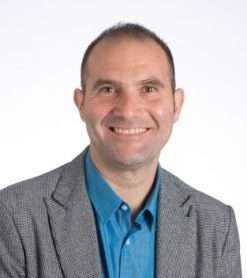
Professor Frede Blaabjerg, Aalborg University, Denmark
Topic
Transitioning from single Wind Turbine to Energy Islands – the Danish Case towards high Energy Security
Wind turbines have undergone a significant technology development the last 40 years – and the turbines are still increasing in size to reduce cost of energy – it is already cost competitive with fossil fuels – one of the pioneering countries have been Denmark which today often has more production of wind electricity than consumed – and they still expand their capacity – recently decided to be placed off-shore on artificial islands in GW scale to collect power – do hydrogen on-site – or transport the energy electrically on-shore. Those aspects will be discussed in the presentation.
Biography
Professor Frede Blaabjerg of Aalborg University, Denmark, has made significant contributions to the field of electrical engineering. His career began at ABB-Scandia, Randers, Denmark, where he worked from 1987 to 1988. He went on to earn his PhD degree in Electrical Engineering from Aalborg University in 1995. Starting as an Assistant Professor in 1992, he advanced to become an Associate Professor in 1996, and then Professor of power electronics and drives in 1998. Since 2017, he has held the prestigious position of Villum Investigator.
Blaabjerg’s research interests primarily focus on power electronics and its various applications, including wind turbines, PV systems, reliability, harmonics, and adjustable speed drives. His contributions to the field are reflected in his extensive publication record, with over 600 journal papers. He is the co-author of four monographs and has served as the editor of ten books on power electronics and its applications.
Throughout his career, Blaabjerg has been recognized for his exceptional work. He has received numerous accolades, including 30 IEEE Prize Paper Awards, the IEEE PELS Distinguished Service Award in 2009, the EPE-PEMC Council Award in 2010, the IEEE William E. Newell Power Electronics Award in 2014, and the Villum Kann Rasmussen Research Award in 2014.
Professor Blaabjerg has also played key roles in various professional organizations. He served as the Editor-in-Chief of the IEEE TRANSACTIONS ON POWER ELECTRONICS from 2006 to 2012. He was a Distinguished Lecturer for the IEEE Power Electronics Society from 2005 to 2007 and for the IEEE Industry Applications Society from 2010 to 2011, as well as from 2017 to 2018. In 2019-2020, he held the position of President of the IEEE Power Electronics Society. Additionally, he serves as Vice-President of the Danish Academy of Technical Sciences. His expertise has led to his recognition as one of the most cited researchers in Engineering worldwide, as nominated by Thomson Reuters for the period of 2014-2018.
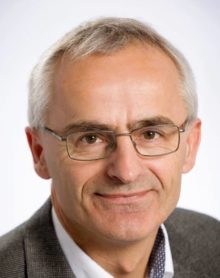
Seán McGoldrick Chief Executive Officer, TasNetworks, Australia
Topic
Technology and Power at TasNetworks– Opportunities & Challenges
The evolution of technology presents both opportunities and challenges for the transmission and distribution of power in Tasmania. TasNetworks CEO, Dr Seán Mc Goldrick will share insights in relation to microgrids, smartgrids and inverter-based resources. Dr Mc Goldrick’s presentation will include case-studies, and an overview of the Digital Twin Project in Tasmania.
Biography
Seán McGoldrick is a visionary leader in the energy sector, known for his unwavering commitment to driving innovation, sustainability, and reliability within the industry. With a career spanning several decades, Seán has continuously demonstrated his expertise and dedication to the field, culminating in his appointment as the Chief Executive Officer of TasNetworks in August 2021.
As the CEO of TasNetworks, Seán McGoldrick has played a pivotal role in shaping the future of Tasmania’s energy landscape. Under his leadership, TasNetworks has not only maintained its reputation as a trusted and dependable energy provider but has also embraced cutting-edge technologies and forward-thinking strategies to ensure a sustainable and resilient energy grid for the future.
In November 2021, McGoldrick was honoured with a prestigious position as a Director on the Energy Networks Australia Board, a testament to his profound influence and expertise in the energy sector. This role has enabled him to contribute significantly to the broader energy industry, working collaboratively with industry leaders to address critical challenges and explore opportunities for growth and improvement.
Seán McGoldrick’s dedication to the energy sector extends beyond his role at TasNetworks and the Energy Networks Australia Board. He currently holds several key positions on relevant Boards and Committees, further solidifying his commitment to advancing the industry. Notably, he serves as the Chair of CIGRE, where he actively champions international cooperation and the exchange of knowledge in the field of energy.
Additionally, McGoldrick is a valued Director of the Transmission Committee, where he plays a vital role in shaping the strategic direction of this critical sector of the energy industry. His expertise and insight are also reflected in his position as a Director of Grid Australia, where he contributes to discussions and initiatives aimed at enhancing the stability and efficiency of Australia’s electricity grid.
Seán McGoldrick’s impressive career and his tireless dedication to the energy sector have earned him a well-deserved reputation as a visionary leader, fostering innovation and sustainability in the pursuit of a more resilient energy future. His multifaceted roles and responsibilities within the industry continue to make a significant impact, and his influence is poised to shape the energy landscape for years to come.

Professor Andrew M. Knight, University of Calgary, Canada
Topic
DER Integration – Technology and Beyond
The desire to transition to high penetration of clean renewable energy is ubiquitous. However, the challenges to be overcome to enable this transition are dependent on local conditions. Existing grid infrastructure, load characteristics, policy, politics, climate and geography all influence the technical requirements that engineers must meet to enable further DER integration.
This presentation will address some of the approaches to support integration of renewable energy from large systems to microgrids. The influence of each of the above external non-technical factors on the technical solutions is explored, with specific case studies based in Canada. These include the impact of temperature on energy storage systems, need for microgrids for resiliency to wildfire, solutions to maximize transmission system usage and methods to design microgrids around existing infrastructure.
Biography
Andrew M. Knight (Senior Member, IEEE) received the B.A. and Ph.D. degrees from the University of Cambridge, in 1994 and 1998, respectively. He is a Professor and the Head of the Department of Electrical and Software Engineering, University of Calgary. His research interests include energy conversion and clean and efficient energy utilization. He is a Professional Engineer registered in the Province of Alberta, Canada. He is a recipient of the IEEE PES Prize Paper Award and three Best Paper Awards from IEEE IAS. He is currently the Vice President of IEEE IAS and was previously the IAS Publications Chair, the Steering Committee Chair of IEEE ECCE and IEEE IEMDC, and the Chair of IEEE Smart Grid Research and Development Committee.
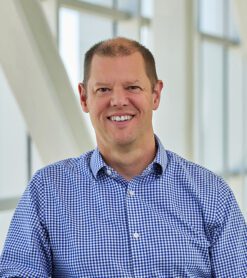
Professor Gerard Ledwich, Queensland University of Technology, Australia
Topic
A vision for energy supply
Customers have many loads and potentially generation which can be automatically adjusted to respond to system needs. A fast responsive system requires low latency communication as well as incentives for a strong engagement. The presentation will address the benefits of fast customer response as well as the barriers implementation.
Biography
Prof Ledwich has been at QUT since 1999 and is currently Discipline leader for Power Engineering as well as Theme Leader in the Institute for Future Environments. The Power Engineering Discipline covers the fields of power system with studies in risk managed distribution planning , wide area controls for transmission and in demand management and this is a strong focus for Prof Ledwich’s research. The power electronics area of his research covers the control of microgrids, power hardware in the loop. The other aspect of his power engineering research is in the equipment area where there is research on the on-line condition monitoring of oil-paper insulation. The power engineering group led by Prof Ledwich is a leading winner of ARC funds nationally and has established good relations with many industries nationally and other universities worldwide.

Professor Anurag K. Sirvastava, West Virginia University, USA
Topic
Enabling Cyber-Power Resiliency for Future Grid with IoT Services
During cyber events, keeping the power on to critical facilities such as hospitals and fire department is essential. A number of resources are available with the integration of distributed energy resources (DER) to help improve the resiliency of the critical loads during adverse events in a power grid. DER’s are also being connected as Internet of Things (IoTs) Minimizing the impact of cyber-attack on the grid depends on one of these key factors: a) planning for cyber defense including services from IoT devices but preserving privacy, b) training of human operators and employee, and c) metric-driven control and operational decisions. A formal metrics is needed to quantify the cyber resiliency of the electric grid and how to use that for operational cyber-resilience considering IoT devices. This talk will cover the basics of cyber-power resiliency, tools for operational decision, and a testbed to validate cyber-resilience tools for the electric grid.
Biography
Anurag K. Srivastava is a Raymond J. Lane Professor and Chairperson of the Computer Science and Electrical Engineering Department at the West Virginia University. He is also an adjunct professor at the Washington State University and senior scientist at the Pacific Northwest National Lab. He received his Ph.D. degree in electrical engineering from the Illinois Institute of Technology in 2005. His research interest includes data-driven algorithms for power system operation and control including cyber-resiliency analysis. Dr. Srivastava high impact research projects resulted in tools installed at the utility control center supported for more than $60M by US Department of Energy, National Science Foundation, Siemens Corporate Research, Electric Power Research Institute, Schweitzer Engineering Lab, Power System Engineering Research Center, Office of Naval Research and several National Labs. In past years, he has worked in a different capacity at the Réseau de transport d´électricité in France; RWTH Aachen University in Germany; PEAK Reliability Coordinator, Idaho National Laboratory, PJM Interconnection, Schweitzer Engineering Lab (SEL), GE Grid Solutions, Massachusetts Institute of Technology and Mississippi State University. He has delivered 30+ keynotes/ tutorials/ IEEE distinguished lecture in more than 15 countries. He is an IEEE Fellow and the author of more than 360 technical publications including 3 books and 3 patents.
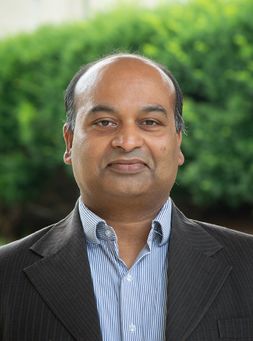
Professor Sukumar Kamalasadan, University of North Carolina at Charlotte, USA
Topic
Decision Support System and Control of Electric Grid: Technologies, Challenges and Opportunities
Decision support system and control is the backbone of modern electric grid management architecture. The future electric grid requires extensive upgrades and changes to the existing decision system and control especially due to: a) Higher integration of renewable energy resources (RERs) both at the bulk, and distribution grid level and the difficulty in managing and controlling these resources, b) Integration of large fleet of newer and greener technologies such as electric vehicles, c) recent increase in the number of man-made and natural events, and d) requirements to integrate additional technologies to support the electric grid such as energy storage systems. Thus, an integrated approach to managing the future electric grid is becoming a necessity. This talk will mainly cover the existing decision support and control technologies of the electric grid, challenges in managing and controlling of future electric grid, and discuss opportunities including a framework for the future electric decision support system management and control architecture.
Biography
Sukumar Kamalasadan is a Professor and Distinguished Scholar of electric power engineering at the University of North Carolina at Charlotte (UNCC) and the Director of power energy and intelligent systems lab (PEISL) within the Energy Production and Infrastructure Center (EPIC) at UNCC. He received his Ph.D. degree in electrical engineering from the University of Toledo, OH in 2004. His research interests include inverter-based resources modeling and integration, data-driven approaches to power grid modernization, power system operation and optimization, and power system dynamics, stability, and control. Prof. Kamalasadan’s research for the last 20 years has resulted in tools and methods that have a high-level impact on electric utility modernization with a fleet-wide deployment of his tools that enabled modern grid management and control towards 100% integration of renewable energy. His research work has secured more than $14M in grants and contracts notably from the US Department of Energy, National Science Foundation (NSF), Siemens Energy, Duke Energy Corporation, Schweitzer Engineering Lab, and several other industries. He is the chief architect of Duke Energy Smart Grid Laboratory at UNCC, a $5M facility, and has led multi-institutional research grants with partners from industries, universities, and the U.S. Department of Energy national laboratories. Prof. Kamalasadan has co-authored more than 250 refereed journal and conference articles including 4 patents and has received several awards from IEEE and NSF including the National Science Foundation CAREER award and multiple IEEE prize paper awards. He has delivered more than 100 talks in the form of tutorials, keynotes, panels, and webinars/workshops at various international IEEE conferences.
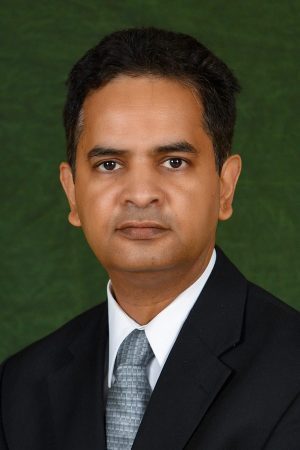
Dr. Bronwyn Evans AO Commissioner, Independent Planning Commission NSW; Chair, Building 4.0 CRC, Australia
Topic
Engineering needs you! Why getting more women into engineering is vital to ensure a successful energy transition – and so much more
Biography
Dr Bronwyn Evans AM has 40 years’ experience in engineering. She has a PhD in Electrical Engineering and an Honorary Doctorate from Swinburne University
She is the Chair of Building4.0 CRC, a Director of Standard Communications (GME), a Director of ACOR Consultants and a Director of EBR Systems Inc (ASX EBR). She is also a Commissioner in the NSW Independent Planning Commission.
She has held the positions of CEO of Engineers Australia and CEO of Standards Australia and has been a senior executive at medical technology companies Cochlear and GE Healthcare. She started her career working on power generation and power distribution projects at the Electricity Commission of NSW.
In 2021 she received an AM in the Queen’s Birthday honours for significant service to engineering, to standards, and to medical technology.


